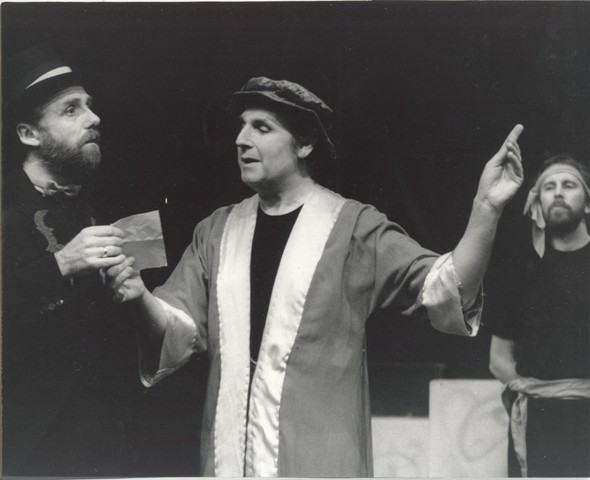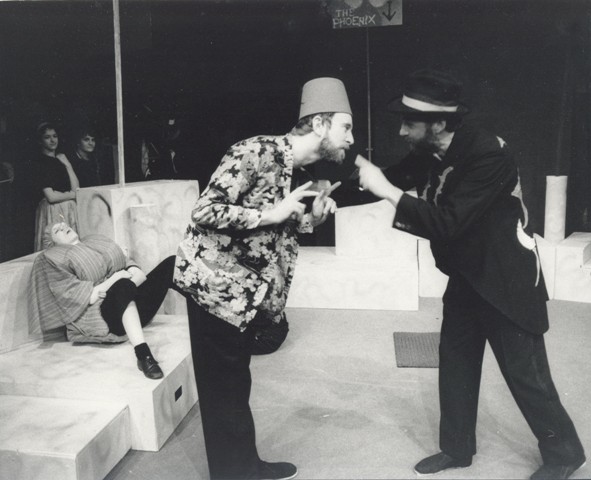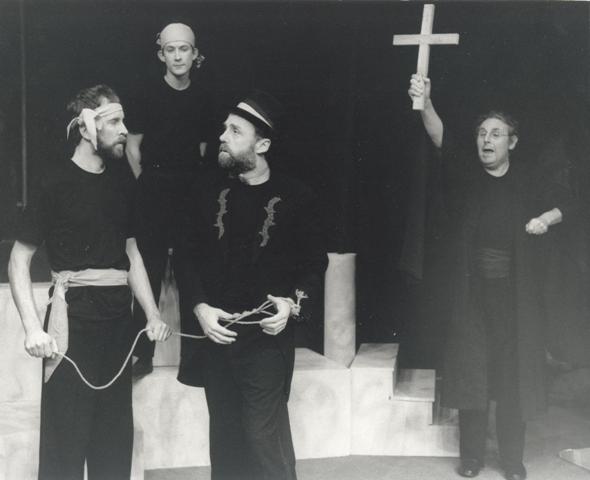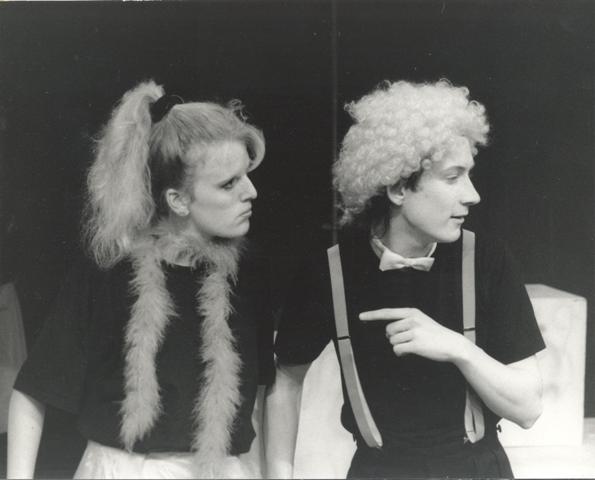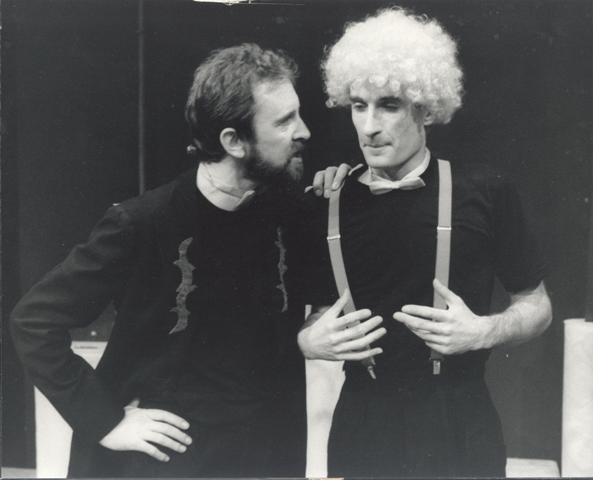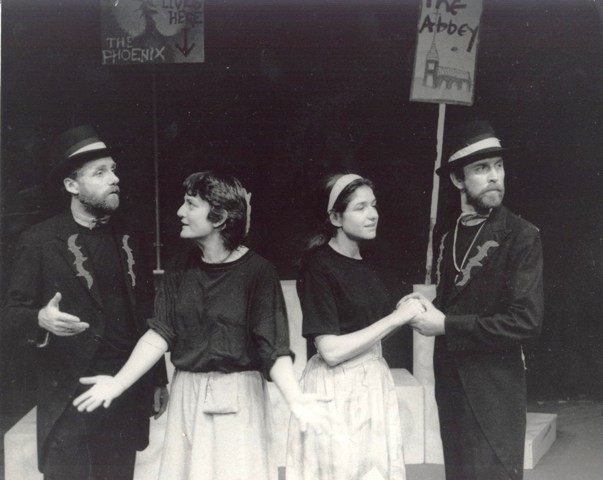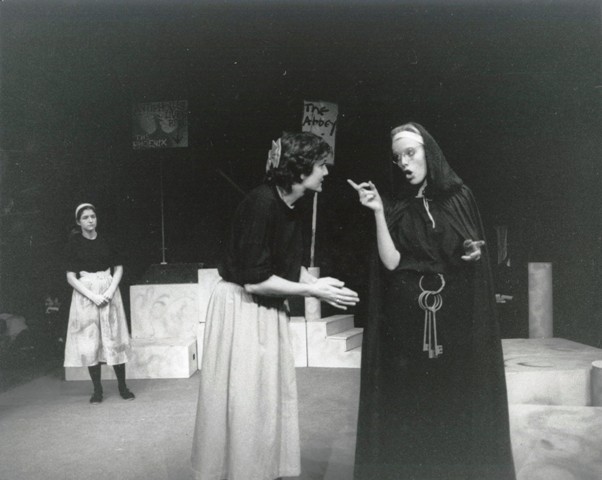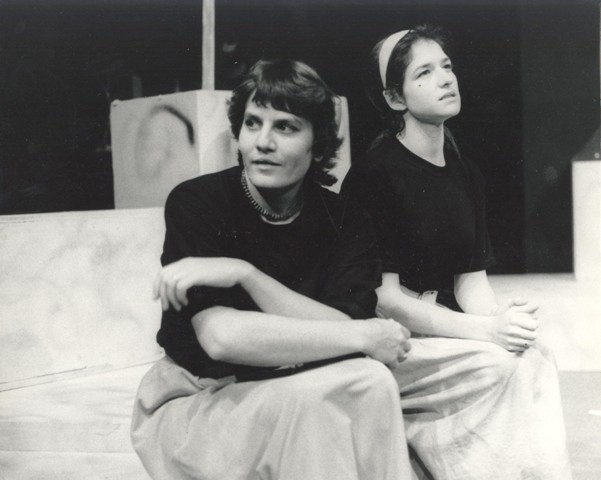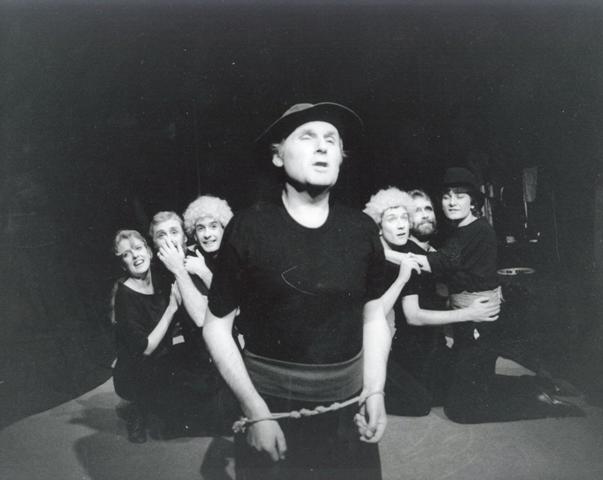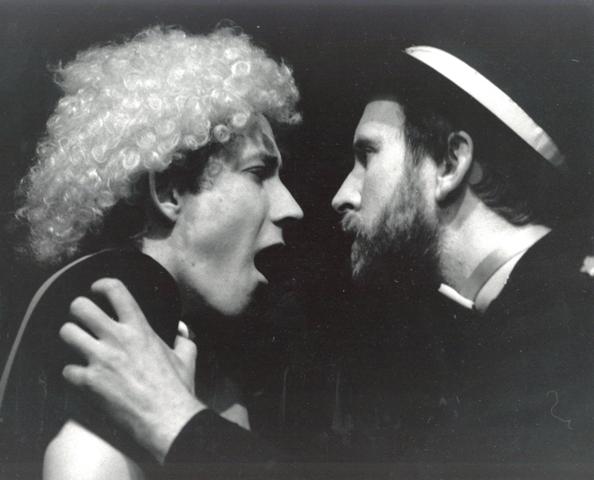The Comedy of Errors
Written by William Shakespeare
Thurs 4th December - Sat 6th December & Tues 9th December - Sat 13th December 1986
Directed by Ingrid Corrigan
One of Shakespeare's funniest (and easiest) plays, the action revolves around two sets of identical twins, separated in childhood but about to be reunited. Follow their story, full of mistaken identity and wrongful accusation - will you be able to spot the difference?
previous
production
next
production
AuthorWilliam Shakespeare
William Shakespeare (1564 - 1616)
Shakespeare is considered by many to be the greatest playwright of all time and is possibly the most famous playwright in the English-speaking world.
Born in Stratford-upon-Avon he was also probably educated there however, very little is known of his early life. The next documented event in his life is his marriage in 1582 to Anne Hathaway. The couple had a daughter the following year and twins in 1585. Another gap followed (referred to by some scholars as 'the lost years') with Shakespeare only reappearing in London in 1592, when he was already working in the theatre.
Shakespeare's acting career was spent with the Lord Chamberlain's Company, which was renamed the King's Company in 1603 when James succeeded to the throne. The group acquired interests in two theatres in the Southwark area of London, near the banks of the Thames - the Globe and the Blackfriars.
Shakespeare's poetry was published before his plays, with two poems appearing in 1593 and 1594, dedicated to his patron Henry Wriothesley, Earl of Southampton. Most of Shakespeare's sonnets were probably written at this time as well. Records of Shakespeare's plays begin to appear in 1594, and he produced roughly two a year until around 1611. Some of his most famous tragedies (including Macbeth) were written in the very early 1600s. The first collected edition of his works wasn't published until 1623, some 7 years after his death.
Shakespeare spent the last five years of his life in Stratford, and he was buried in the Holy Trinity Church there.
'The Comedy of Errors' is one of Shakespeare's earliest plays, possibly the first, written sometime between 1590 and 1594. The principal source was Plautus' 'Menaechmi', a play on the theme of the folly of shrewish wives. Whether Shakespeare read the play in Latin, in a translation, heard it from a friend, or saw it acted, is not known. Another play by Plautus, 'Amphitruo', supplied the scene in which Adriana feasts a man she wrongly believes to be her husband, while her real husband is locked out. 'Amphitruo' may have suggested, too, the addition of a pair of servant twins to the 'Menaechmi', though Shakespeare (himself the father of twins) could also have borrowed the idea from various Commedia dell'Arte plays. He moved the action from Epidamnus, the scene of Plautus' play, to Ephesus, which had a reputation for the study of magic spells, witchcraft and sorcery.
Egeon, a Syracusean merchant and his wife Emilia are shipwrecked with their twin baby sons, both called Antipholus, and their twin servants both called Dromio. Egeon, one son and one slave get back to Syracuse, the other three reach Ephesus, though Emelia is separated, and thinking she had lost all her family enters a convent of which she becomes Abbess. When eighteen, Antipholus of Syracuse goes with his Dromio in search for his brother; Egeon has no news, and spends five years looking for him. All arrive at Ephesus on the same day, but as Syracuse and Ephesus are at enmity Egeon is arrested and then condemned to death unless he can pay a ransom of a thousand marks by the evening. Antipholus of Ephesus is married to Adriana who mistakes Antipholus of Syracuse for her husband, whom she locks out. The two Dromios are also confused. Both Antipholuses are so bewildered that they are both in danger of being confined as lunatics. Antipholus appeals to the Duke as he accompanies Egeon to the execution, and the Abbess intercedes for Antipholus of Syracuse who has taken refuge with her, and the recognition scene follows.
top of page
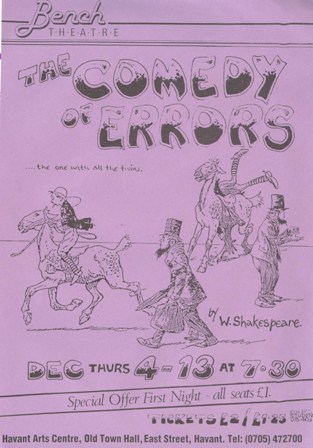
This play was staged at Havant Arts Centre, East Street Havant - Bench Theatre's home since 1977.
| Egeon | John Scadding |
| (Voice of) Solinus | Rob Finn |
| First Merchant | John Scadding |
| Antipholus of Syracuse | Peter Holding |
| Antipholus of Ephesus | Pete Woodward |
| Dromio of Syracuse | Richard Stacey |
| Dromio of Ephesus | Simon Iggledon |
| Adriana | Jacquie Penrose |
| Luciana | Belinda Egginton |
| Nell | Jude Salmon |
| Balthasar | Peter Holding |
| Angelo | John Scadding |
| Second Merchant | Simon Iggledon |
| An Officer | Peter Holding |
| A Courtesan | Jude Salmon |
| Doctor Pinch | John Scadding |
| Emelia | Jude Salmon |
| A Messenger | Richard Stacey |
Crew
| Director | Ingrid Corrigan |
| Stage Manager | Karen Bickers |
| Technical Crew | Vincent Adams
Bill Bickers
Rob Finn
Dan Shires |
| Lighting | Mike Boyce |
| Costumes | Robbie Cattermole |
| Company Stage Manager | David Hemsley-Brown |
| Mask | Cerys Hogg |
| Publicity | John Valentine |
| Additional script and artwork | David Penrose |
| Programme | Peter Corrigan
Paula Martin |
| House Manager | Terry Cattermole |
Director's Notes
Mistaken identity surrounding twins has been a universally popular theme with playwrights for centuries. On film, it is possible to be extremely economical and use the same actor and lots of lines down the middle of the picture. We have no such trickery at our disposal and no identical twins in our company. Hence our backstage area is exposed to the audience and actors will change character and costume before your very eyes. Much of the humour lies in the fact that the audience is always one step ahead of the characters in the play. Sit back, relax, and enjoy 'The Comedy of Errors'.
Ingrid Corrigan
top of page
The NewsSue Wilkinson
See this show at the double
One set of twins took advantage of the Bench Theatre's generous offer of free tickets for identical twins who attended the first night of 'The Comedy of Errors' at Havant Arts Centre, East Street, last night. But after hearing about the quality of the production there are more who will kick themselves for looking a gift horse in the mouth. They missed a superbly acted rollicking comedy that no one would have begrudged the ticket money to see. And Graham and Gary Bannister enjoyed themselves so much that they intend to have a double helping of the play about the mayhem and mistaken identity which occurs when two sets of identical twins happen to be in the same city on the same day.
Members of the amateur company took the text by the scruff of the neck and shook a farce out of the Bard's words which brought tears of joy running down the cheeks. Knockabout comedy was interspersed with moments of genius which stripped Shakespeare of the starchy, courtly, doublet-and-hose treatment it often receives, and gave it a street entertainment style everyone could enjoy. The actors used the art of mime to help tell the tale of a member of two sets of twins, each looking for his long lost brother. The families had been separated after a shipwreck. Jude Salmon gave her Abbess a Scottish accent for a speech which could have sent the audience to sleep but instead turned it into a scene stealer.
The best part of all was the crib-notes read from the side-lines by two "interpreters" helping the audience through a particularly difficult part of the text. They spoke a "translation" while the main characters stuck to the original wording. All the actors were uninhibited by the difficult rhyme and, apart from some fluffed lines from them all, they gave a hilarious and riveting rendition of the play. Themes of division, separation, love and servitude were not buried in the fast-moving (two hours) presentation of Shakespeare for which you would be hard pressed to find a peer. 'The Comedy of Errors' runs until December 13. See it at the double.
The News, 5th December 1986
top of page
Production Photographs

